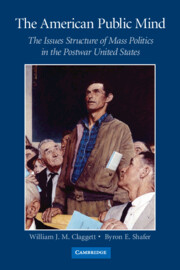9 - The Issue Structure of Mass Politics
Published online by Cambridge University Press: 05 June 2012
Summary
This book began with a set of arguably fundamental questions, fundamental to an understanding of the place of public opinion in American politics, of course, but ultimately fundamental to the health of a mass democracy in the United States. What was the nature of substantive conflict in the American public mind during the postwar years? Can the answer reasonably be described as contributing an “issue context” having recognizable connections among its composite elements along with temporal stability in these connections? If so, how do policy issues cluster, and nest, within this substantive environment for mass politics? How does such a structure – and positive answers to those questions do indeed constitute the “structure” of public preferences – relate to the keystone activity of democratic politics, namely voting? And what do these voting patterns, if any, reveal about “the big picture” of American politics over the past half-century?
From 1948 through 2004 and counting, the American National Election Study has asked national samples of the American public about their preferences on major policy conflicts and about the political behavior that follows (or does not) from them. These are the data for an empirical answer to those fundamental questions, an empirical answer with normative implications. Fortunately, the picture that emerges from asking them is both structured and stable. The public does offer a differentiated set of policy dimensions to its opinions within the major realms of postwar political conflict.
- Type
- Chapter
- Information
- The American Public MindThe Issues Structure of Mass Politics in the Postwar United States, pp. 266 - 276Publisher: Cambridge University PressPrint publication year: 2010



